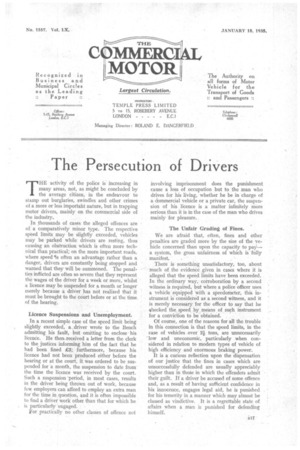The Persecution of Drivers
Page 31

If you've noticed an error in this article please click here to report it so we can fix it.
THE activity of the police is increasing in many areas, not, as might be concluded by the average citizen, in the endeavour to stamp out burglaries, swindles and other crimes of a more or less importaht nature, but in trapping motor drivers, mainly on the commercial side of the industry.
• In thousands of cases the alleged offences are of a comparatively minor type. The respective speed limits may be slightly exceeded, vehicles may be parked while drivers are resting, thus causing an obstruction which is often more technical than practical; on the more important roads, where speed his often an advantage rather than a danger, drivers are constantly being stopped and warned that they will be summoned. The penalties inflicted are often so severe that they represent the wages of the driver for a week or more, whilst a licence may be suspended for a month or longer merely because a driver has not realized that it must be brought to the court before or at the time of the hearing.
Licence Suspensions and Unemployment.
In a recent simple case of the speed limit being slightly exceeded, a.,driver wrote to the Bench admitting his fault, but omitting to enclose his licence. He them received a letter from the clerk to the justices informing him of the fact that be had been_ fined £3; furthermore, because his licence had not been produced either before the hearing or at the court, it was ordered to be suspended for 'a month, the suspension to date from the time the licence was received by the court. Such a suspension period, in most cases, results in the driver being thrown out of work, because few employers can afford to employ an extra man for the time in question, and it is often impossible to find a driver work' other than that for which he is particularly engaged.
For, practically no other classes of offence not involving imprisonment does the punishment cause a loss of occupation but to the man who drives for his living, whether he be in charge of a dornmercial vehicle or a private car, the suspension of his _licence is a matter infinitely more serious than it is in the case of the man who drives mainly for pleasure.
The Unfair Grading of Fines.
We are afraid that, often, fines and other penalties are graded more by the size of the vehicle concerned than upon the capacity to pay— a system, the gross unfairness of which is fully manifest.
There is something unsatisfactory, too, about much of the evidence given in cases where it is alleged that the speed limits have been exceeded. In the ordinary way, corroboration by a second witness is required, but where a police officer uses a vehicle 'equipped with a speedometer, this instrument is considered as a second witness, and it is merely necessary for the officer to say that he 41-iecked the speed by means, of such instrument for a conviction to be obtained.
Of course, one of the reasons for all the trouble in this connection is that the speed limits, in the case of vehicles over 21 tons, are unnecessarily 'low and uneconomic, particularly when considered in relation to modern types of vehicle of high efficiency and enormous braking power.
It is a curious reflection upon the dispensation of our justice that the fines in cases which are unsuccessfully defended are usually appreciably higher than in those in which the offenders admit their guilt. If a driver be accused of some offence and, as a result of having sufficient confidence in his innocence, engages legal aid, he is punished for his temerity in a manner which may almost be classed as vindictive. It is a regrettable state of affairs when a nian is punished for defending himself.




























































































